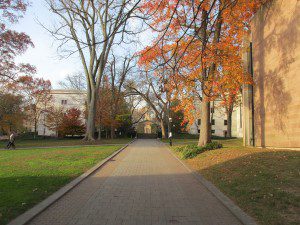 Two days ago, I noted on this blog a front-page story in the New York Times on the decision of Bowdoin College administrators to effectively displace Bowdoin Christian Fellowship from its status as a college-recognized student organization.
Two days ago, I noted on this blog a front-page story in the New York Times on the decision of Bowdoin College administrators to effectively displace Bowdoin Christian Fellowship from its status as a college-recognized student organization.
I just read a statement the college released about the Times article that advances the viewpoint I just sketched out:
Religious freedom and spirituality are alive and thriving at Bowdoin. Contrary to the Times article, the College continues to recognize the Bowdoin Christian Fellowship (BCF) and has no plans to drop that recognition after this summer. Bowdoin students practice their faith openly on campus as members of student organizations, and off campus at area churches, synagogues, temples, and other venues. There are currently eight faith-based student organizations at Bowdoin that meet regularly, present and sponsor programming, and add significantly to the life of the College. These include five Christian groups (BCF, the Catholic Student Union, the Bowdoin Orthodox Association, the Bowdoin Community Gospel Choir, and a new Quaker student group), Bowdoin Circle, a Jewish group, and a Muslim organization. Student members are free to speak openly about and practice their faith. They are free to advocate, debate, question, and to recruit new members. They are free to sponsor speakers or other presentations that promote their beliefs. And they are also free to choose their own student leaders.
This issue arose when two outside volunteers associated with the national Intervarsity Christian Fellowship and BCF refused to sign an agreement barring discrimination because they wanted to dictate the leadership of BCF. Volunteer advisors at Bowdoin cannot make these choices for our students. These decisions are up to the students themselves.
Here’s the whole thing. Note the words of Bowdoin’s statement: religious freedom is “alive and thriving.” Unless, that is, one happens to believe in historic Christian orthodoxy. In that case, one is packing one’s bags and moving off campus.
This is the college’s doing. In recent days, it required BCF leadership to sign a draconian “anti-discrimination” statement that barred the organization from requiring leaders to conform to biblical sexual practice (the statement also barred “discrimination” on the basis of “gender identity,” so the group couldn’t prohibit transgendered individuals from leadership). The college’s logic is that BCF, though a Christian group, will “discriminate” against applicants practicing a homosexual or transgender lifestyle if it does not allow them to hold a leadership position.
According to the Bangor Daily News–the paper I read every day growing up in Machias, Maine–Bowdoin officials attempted to explain their decision further: “Bowdoin spokesman Scott Hood told the Bangor Daily News on Wednesday that the college had “taken no steps to ‘unrecognize’ Bowdoin Christian Fellowship. The error — it’s semantics, I suppose — is that they reported that we have cut their recognition.” Again, this is eye-opening stuff. A 40-year student group losing its status by the use of a heavy-handed bias statement is not an issue of “semantics.” It’s a matter of compromised religious freedom, and beyond this, compromised freedom of association and compromised freedom of speech.
Bowdoin has effectively told a student group what it can believe. Holding that a homosexual lifestyle is not in keeping with leadership of a Christian organization is now out of bounds, despite the fact that this is the overwhelmingly common position among Christians. Bowdoin’s action sets a woeful precedent: it allows the college to police the theology of its student organizations, many of which have some connection to volunteer leadership of the kind Rob and Sim Gregory provide to BCF through InterVarsity Christian Fellowship, and which other volunteers have rendered for more than four decades to great effect in Brunswick.
BCF, in point of fact, is not discriminating against anyone. It is selecting leaders in keeping with its views just like the College Democrats do, the Belly Dance enthusiasts do, the Muslim Student Association does. None of these groups are pejoratively “discriminating” by selecting leaders that fit their beliefs. They are acting according to common sense, and to the quintessential American principles of freedom of association and the freedom of speech.
Bowdoin, ironically, is discriminating against BCF. Perhaps most shockingly, it’s moving against its own student body. Think about this: the college you love and pay tuition to at a hefty clip telling you that your beliefs are “discriminatory” despite their consonance with orthodox Christianity. You haven’t protested anyone, haven’t gotten into a shouting match–all you’ve done is join up with a bunch of students to worship God together on the campus you love. You’re not trying to be Martin Luther here; you’re just trying to practice your religion, to love God and love people as the Bible directs.
If you were 19, would the college’s very public action have an effect on you? I think it might. I think it might profoundly unsettle you, wound you, disillusion you.
I grieve for what has happened to the students of Bowdoin Christian Fellowship. Their own administration, which they respect and admire, has come after them, has made a public spectacle of them, has compared their volunteer leader publicly to convicted pedophile Jerry Sandusky (see here), has asked them to sign a statement that compromises their convictions, and in so doing has virtually guaranteed that BCF as it currently stands will lose its official student-group status. This is a grave injustice, but remember that it has not been committed merely against volunteers, but Bowdoin’s own students.
I know a number of the students involved (and profiled in the NYT article), and they are kind, generous, academically proficient, and contributing members of the Bowdoin community. These are not students who hold picketing signs against other organizations. They are gentle, meek, and very, very young. They had no desire to take on their college; the bias policy of Bowdoin was forced upon them. Furthermore, they love Bowdoin. Bowdoin is a small school, it’s a close community, and it draws students who like that kind of environment, and who thrive in its climate of respectful intellectual exchange. As I wrote in the American Spectator, I loved Bowdoin for these reasons. Everyone doesn’t agree on everything, but that’s actually part of the very creed of the institution–the school pledges to cultivate “generous enthusiasms” in students through give-and-take with their peers and tutors. It’s part of what makes going to Bowdoin so fun.
But all this is in jeopardy.
Bowdoin was founded as a Congregationalist school to train an evangelical pastorate. Now the school is displacing its very small and long-standing Christian fellowship. These are strange times. They are strange in my view for two reasons: first, I was asked this very week to give to Bowdoin. You can imagine how hard I swallowed when I read the email soliciting my money. My beloved alma mater, a school of pristine New England beauty, terrific pedagogy from a genuinely exhilarating faculty, and a place that left me with countless great memories, is publicly moving against BCF, the organization I was a part of for four years, and the school wants my money?
Irony of this kind should come with shallots and truffle butter.
Second, the days are strange because unlikely voices are recognizing that Bowdoin has overstepped, and to a severe degree. Here’s Kevin Drum from Mother Jones–no friend of the far right, to be sure–on how Bowdoin has overreached (see also National Review, The Week, and Commentary, among others) :
[R]equiring Christian groups to allow non-believers to lead Bible studies and prayer services and so forth? That seems pretty extreme. I have to admit that if I were a member of a campus Christian group, I’d have a hard time believing there were no ulterior motives at work here.
As for the Jewish/Muslim/Catholic/etc. groups that “do not anticipate” problems, I hope they’re right. But this is the kind of thing that’s ripe for mischief-making. I can easily imagine a bunch of campus halfwits who think it would be the funniest joke in the world to join a religious group en masse and then elect an atheist president. These are 19-year-olds we’re dealing with, after all.
But maybe not. Perhaps that requires too much sustained effort. Nonetheless, if it were up to me, I’d allow Jewish groups to remain Jewish and Christian groups to remain Christian if that’s what they want to do. It’s hard to see the harm.
Sadly, it’s not hard to see the harm that Bowdoin is doing–but not merely to heartbroken alumni like me, who had dreamed of possibly sending my own children to the school (as the multiple tiny toddler-sized Bowdoin t-shirts in my home can attest). No, Bowdoin is doing harm to its own students, who love the school and only want to meet together as an official college group.
All this seems unthinkable, but then, again, these are strange times.











